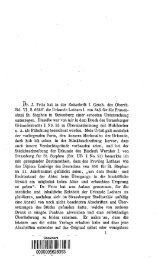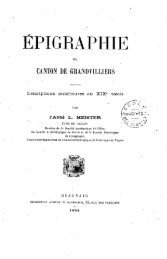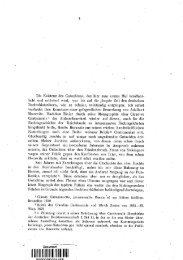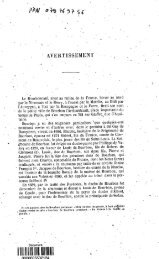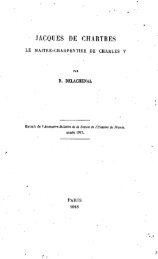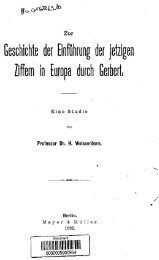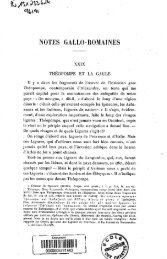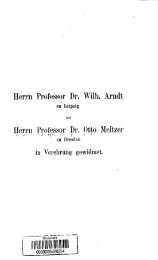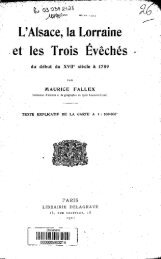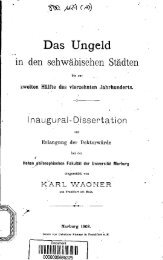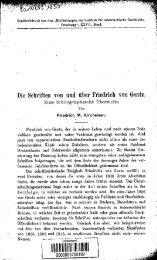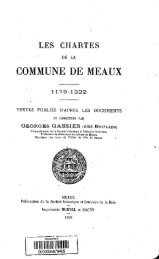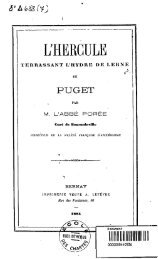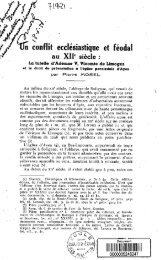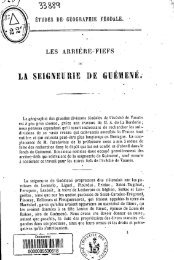4P Li gç(' TRANSACTIONS
4P Li gç(' TRANSACTIONS
4P Li gç(' TRANSACTIONS
Create successful ePaper yourself
Turn your PDF publications into a flip-book with our unique Google optimized e-Paper software.
842 LE LIVRE DE YCONOMIQUE D'ARISTOTE [TRANS. AMER. PHIL. SOC.<br />
T.Mes [Jxiies tie presuina onques trahir ne falser<br />
Fafection et dilection et foy qu'il avoit a sa femme, aim<br />
que ii fust fait irninortel. Et cuidoit ou // (346a)<br />
reputoit que ce seroit tres grant peine pour lui se ii<br />
deservoit avoir ininiortalité et il fust malvés.<br />
G. Or avons donques comnie Aristote et Honiei'us approvent<br />
et bent i'intention et le propos de Uxiles qui tie<br />
voult touchier auti'e que sa teninie pour avoir vie perpetuelle<br />
et amoit plus niourir que pechier pour tousjours<br />
vivre. Et reputoit la plus grande peine qui peust estre<br />
vivre en pechie: Maxiniani penam arhitrans. etc.<br />
• T. Item, il tie vouloit onques jesir oveques une<br />
nommee Circe, niesmenient pour le salut de ses amis.<br />
C. Les textes comniuns ont ainsi : Nani cum Circe<br />
jacere noluit. nisi propter anhicorum salutem. Et ceulz qui<br />
Ic exposent scion ceste lecture (bent qu'iI s'acorda a jesir<br />
Oveques Circe, flies cc fu pour salver ses conipaignons. Et<br />
un expositeur dit que Ic texte est corrumpu, Si coninie en<br />
pluseurs autres lieus et je le cuide pour .ii. raisons. Unc<br />
est que Uxiles refusa tel pechey non obstant que Yen lui<br />
prolileist iiiimortalité pour soy et donques il ne se fust<br />
onques a cc acordé pour la vie temporelc dautres, Item,<br />
scion Aristotc, len ne doit onqucs faire mal afin que bien<br />
en vienne. Et donques ii ne ailegast pas en approuvant que<br />
Ulixes eust fait desloialté et nienti sa foy pour salver ses<br />
conipaignons. Et pour cc, le texte doit estre ainsi : Nani<br />
cum Circe jacere noluit, etiarn propter aniicoruni salutem.<br />
Et ainsi lay je translate. Mes pour cc miex entendre, l'en<br />
doit savoir car si comme recite Saint Augustin ou .xviji.e<br />
livre de la Cite de Dieu, Circe fu tres renonimee en alt<br />
magique et tenoient les peiens que quant Uxiles et sa gent<br />
vindrent par tern- / (346b) peste de nier la ou die estoit,<br />
elle niva en bestes les coinpaignons de Uxiles. Et fait Saint<br />
Augustin mention de pluseurs autres mutations. Et sebon<br />
verité, les mutations ne furent pas teles, mes par aventure<br />
aucuns pevent avoir esté perturbés et alienés en leur disposition<br />
corporele et en leur sens naturels par malefices et<br />
par enchantemens en tant qu'il cuidoient estre leus ou pors<br />
ou chevalz par certain temps et aucuns par tnaiadie, si<br />
conirne sunt ceulz que !'en appelle vulg-airnent quarous. Et<br />
tel malefice fist Circe as compaignons dc Uxiles, nies<br />
Uxiles se contregarda de cc par tine herbe qu 'un homme lui<br />
avoit baillee. Et donques Circe lui proniettoit a reniettre<br />
ses compaignons en leur premier estat se il se consentoit<br />
a elle.<br />
T. Mes il lui respondi que nuile chose ne lui pourroit<br />
sembler plus douce que son paIz, combien qu'ii fust<br />
aspre.<br />
C. I'eut estre que dIe lui proinettoit plus bel paiz et<br />
meileur que ceilui dont ii estoit, nies ii anioit plus a retourner<br />
a sa feninie et a son paiz.<br />
T. Et ora Ulises et pria on vou!ut plus estre mortel<br />
et voir sa fenime et son filz que vivre.<br />
C. Cc est assavoir, pardnirablenient. Mes je cuide que<br />
ceste clause soit transposee et doit eStre apres ces moz ci<br />
quit I usi nialvCs, en la response quil fist a Ia flue du roy<br />
Athias. Car ii anioit plus estre mortel et voir sa feinme<br />
qu'estre immortel sans la voir. Et se ceste clause est en<br />
son ordre, len pourroit dire que Circe oveques le salu de<br />
T. But Ul ysses never intended to betray or deceive<br />
the affection and preference and loyalty he felt for his<br />
wife in order to be made immortal. And he deemed or<br />
// (346a) judged it would he too great a sin for him<br />
to win immortality by committing an evil action.<br />
C. Thus we have learned how both Aristotle and Homer<br />
approve and praise the purpose and action of Ulysses, who<br />
would not touch another woman than his wife even to gain<br />
immortal life. And he preferred to dierather than commit<br />
a sin in order to live forever. And he considered the<br />
greatest possible affliction to live in sin: "Judging it the<br />
greatest punishment, etc." [Oresme quotes original Latin<br />
text].<br />
T. He never desired to lie with the woman called<br />
Circe, even in order to save his comrades.<br />
C. The texts commonly read: "For lie did not wish to<br />
lie with Circe, except to save his companions." And those<br />
who have explained this reading sa y that Ulysses agreed<br />
to lie with Circe, but that he did so only to save his companions.<br />
And one expositor states that the text is here<br />
corrupt as in many other places, and I think likewise for<br />
two reasons. The first is because Ulysses refused such a<br />
sin notwithstanding the promise of immortality and he<br />
would never have agreed to it in order to save the temporal<br />
life of others. Also according to Aristotle, one should<br />
never do evil in order to achieve good. Therefore, he<br />
would not have given his approval to Ulysses for having<br />
acted disloyally and having abjured his faith to save his<br />
companions. Therefore, thetext should read thus: "For<br />
he did not desire to lie with Circe, even- to save his cornpanions."<br />
And I have translated it according to this reading.<br />
But to understand this better, one should know—as<br />
St. Augustin relates in the Ciii' of God XVIII 117, 18]—<br />
that Circe was renowned for her magical powers, and the<br />
pagans maintained that when Ulysses and his men reached<br />
her in the midst of the storm / (346b) at sea, she changed<br />
Ul y sses* companions into animals. And St. Augustin mentions<br />
several other transformations. But in very truth,<br />
the transformations were not such as related, but possibly<br />
some of his men may have been driven Toad and became<br />
disturbed both bodily and mentally b y black arts and enchantments<br />
to the point of imagining themselves to be<br />
wolves or swine or horses for a certain time and some<br />
perhaps were made thus by sickness, like those who are<br />
called werewolves by the common people. And such black<br />
magic did Circe work upon Ulysses' companions. But<br />
Ulysses protected himself from it by means of an herb<br />
which a mail given him. Thereupon Circe promised<br />
to restore his companions to their former state, if lie would<br />
yield himself to her.<br />
T. But lie replied to Circe that nothing could appear<br />
more delightful to him than his native land, however<br />
rugged it might be.<br />
C. Perhaps she had promised him a land fairer and better<br />
than that from which he came, but he preferred to<br />
return to his wife and his fatherland.<br />
T. And Ul ysses prayed and desired to remain a<br />
mortal and to see his wife and his son rather than to<br />
live.<br />
C. That is, to live eternally. But I think that this clause<br />
is possibly placed out of order and should come after the<br />
words by committing an evil action in the reply he made<br />
to the daughter of King Atlas. For he preferred to remain<br />
mortal and see his wife rather than to be made immortal<br />
without seeing her. If this clause is in its proper place,



